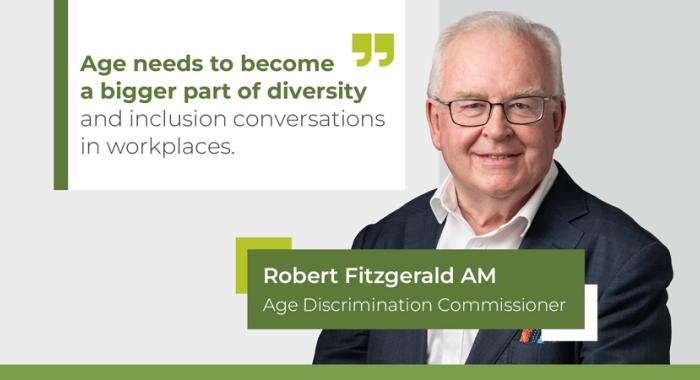In part 2 of our discussion with Age Discrimination Commissioner, Robert Fitzgerald, we cover mature age workers across sectors, advice for mature age workers and how employers can embrace age diversity.
Which employment sectors do you think are doing well to recruit and retain mature age workers, and what can other sectors learn from them?
We know from ABS data, that older people were most employed in the industries of health care and social assistance, agriculture, forestry and fisheries, and education and training.
Increasingly we are hearing of good initiatives in the financial and professional services areas.
But we need more sectors to step up and realise the benefits and imperative to embrace mature and older workers as part of an age-diverse workplace. As mentioned in the first part of this interview, this includes sharing more data and sector-based research on best practices to recruit and retain mature workers. This would encourage increased engagement of mature workers and competition between sectors.
I urge all employers to see employees based on their skills and potential they offer to businesses, irrespective of age. Trade unions also need to be at the forefront of supporting this agenda. We need to value the experience and the learnt wisdom throughout a workers’ life. But I am realistic about this. I am 68, there is a point at which my paid working life will come to an end and older people do have to be realistic.
But it should not be based on your age, it should be based on your capacity and ability to give back into that workplace.
What advice do you have for a mature age person who is looking for meaningful employment or a career change?
We used to attribute people’s lack of capacity based solely on their age. At worst this can lead to age discrimination, but it is simply the wrong way to view the value of any individual. I would encourage any mature or older person looking to make a career change and seek meaningful work to do so. Remember the economy needs you, society needs to you and yes, you do have the right to work.
While employers are obliged not to discriminate in the workplace based on age, there are some actions mature age and older people can take to increase their opportunities to gain a job, such as:
- Try not to internalise ageism, thinking you are too old to try something new.
- Consider upskilling or retraining to industries where there is demand.
- Find out what supports are available e.g. government programs for mature workers, employment services that specifically connect mature workers with employers, and career guidance such as Explore Your Career | Your Career.
- Start the conversation with your manager/employer about transitioning to other roles, flexible work or transitioning to retirement in a positive way. Having access to workplaces that are flexible and responsive to their needs can significantly prolong the working lives of older people to the advantage of workplaces.
Workplace ageist attitudes are changing and the more that older people participate in the workforce, the more lingering ageism will and should be challenged.
DEWR supports a range of mature age people who are looking for work, including recently retrenched workers, people who have been unemployed for years, those who have restrictions on the amount they can work, and anyone who is employed but would like to work more. Employers have identified a shortage of workers, but experience barriers in connecting with mature age people or may unconsciously discriminate against them. What strategies do you think would help connect the unemployed with the employers who need them?
Sometimes it is how age is absent from discussions that suggests devaluation of older workers in a multigenerational workforce. A global survey of 6,000 employers from 36 countries found that more than one in 2 businesses did not include age in their diversity and inclusion policies. If you discount the options before you start, then the opportunities may be missed. 1
Employers ignoring these opportunities will do so to their disadvantage.
But as I stated earlier there are tangible practices and approaches that workplaces can take to be age inclusive, including:
- age neutral recruitment practices
- promoting the age-friendly work practices in your job advertising, such as flexibility
- and overtly stating that your workplace values workers of all ages, including how and why this is done.
Employers need to raise the profile of age diversity and its benefits in their workplaces, not just in how they recruit people but in the way they work each day – it is a big cultural shift for many workplaces.
Leadership is also needed from all levels of government, nonprofit, business and trade unions, to shift the narrative towards age diverse workplaces and drive the positive change needed. Inclusive multigenerational workplaces are our future.
Age needs to become a bigger part of diversity and inclusion conversations in workplaces. This will encourage more mature and older workers to seek to work longer and more workplaces to employ them and value them.
If you would like more information on securing work as a mature age worker or would like to attract mature age people to your business, visit the Mature Age Hub.
1 American Association of Retired Persons (AARP). Employers worldwide often exclude age from diversity policies. (5 August, 2020) – Continue reading

